PUBLICATIONS
ASEANO PROJECT TOOLKIT: Reducing Plastic Pollution in Rivers, Coasts and Ocean: A Toolkit for Local Governments
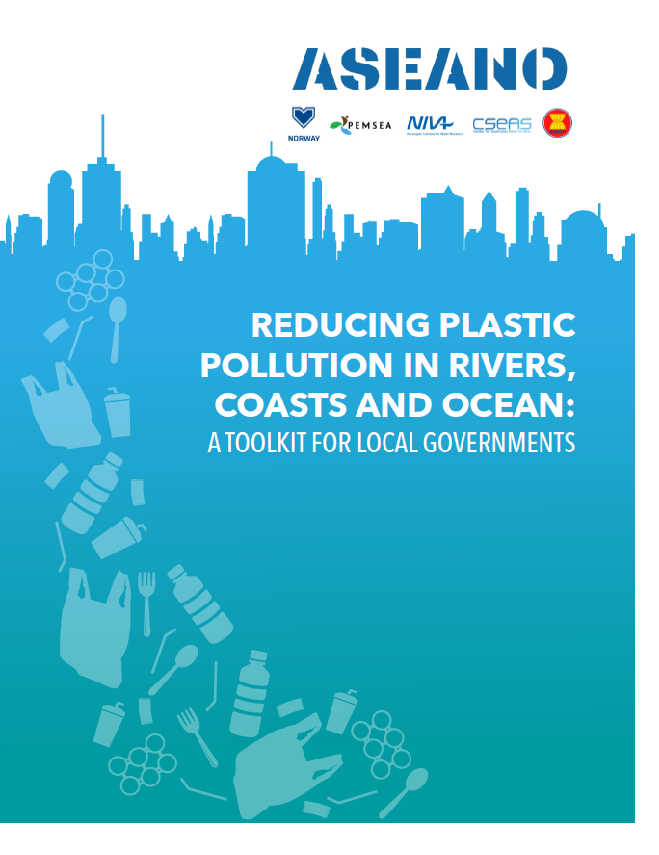
DESCRIPTION: Dealing with plastic pollution requires locally specific actions, tailored to specific conditions, in addition to larger scale and even transboundary agreements and arrangements. Waste management is complex, and requires ongoing and iterative approaches. This toolkit seeks to provide some documents that can assist local governments in their approaches. In an attempt to ensure utility, relevant documents are included only if they are written in English, publicly available, and easily accessible.
End of Project Stakeholders Forum: Philippines ASEAN-Norway Cooperation Project on Local Capacity Building to Reduce Plastic Pollution in the ASEAN Region (ASEANO)
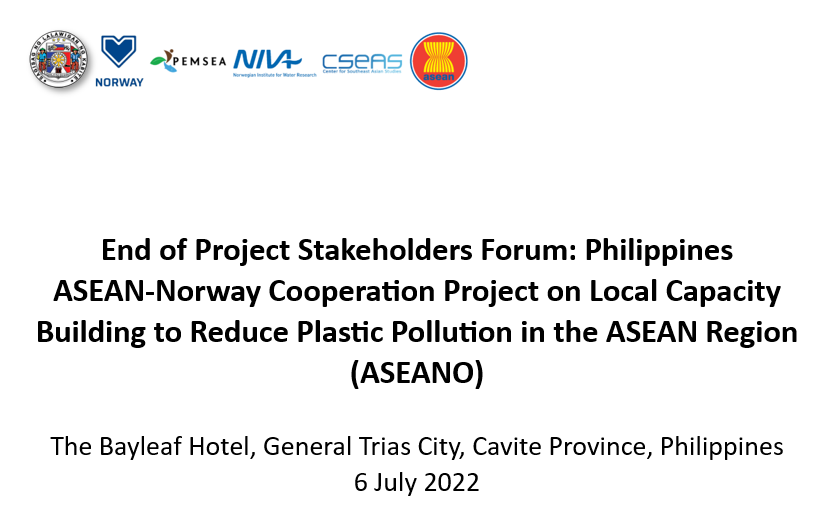
DESCRIPTION: The End of Project Stakeholders Forum for the Philippine Component of the ASEAN Norway Cooperation Project on Local Capacity Building to Reduce Plastic Pollution (ASEANO) was held on 6 July 2022 at the BayLeaf Hotel in General Trias, Cavite, Philippines. The Forum was jointly organized by PEMSEA and the Provincial Government of Cavite through the Provincial Government Environment and Natural Resources Office (PGENRO) and participated by representatives from the local government units (LGUs) along the Imus River Watershed, relevant provincial offices, national government agencies, private sector, nongovernment organizations, academe and the Norwegian Embassy.
ASEANO PROJECT PRIMER: Study on Plastics Use and Waste Management in the Food Service Industry
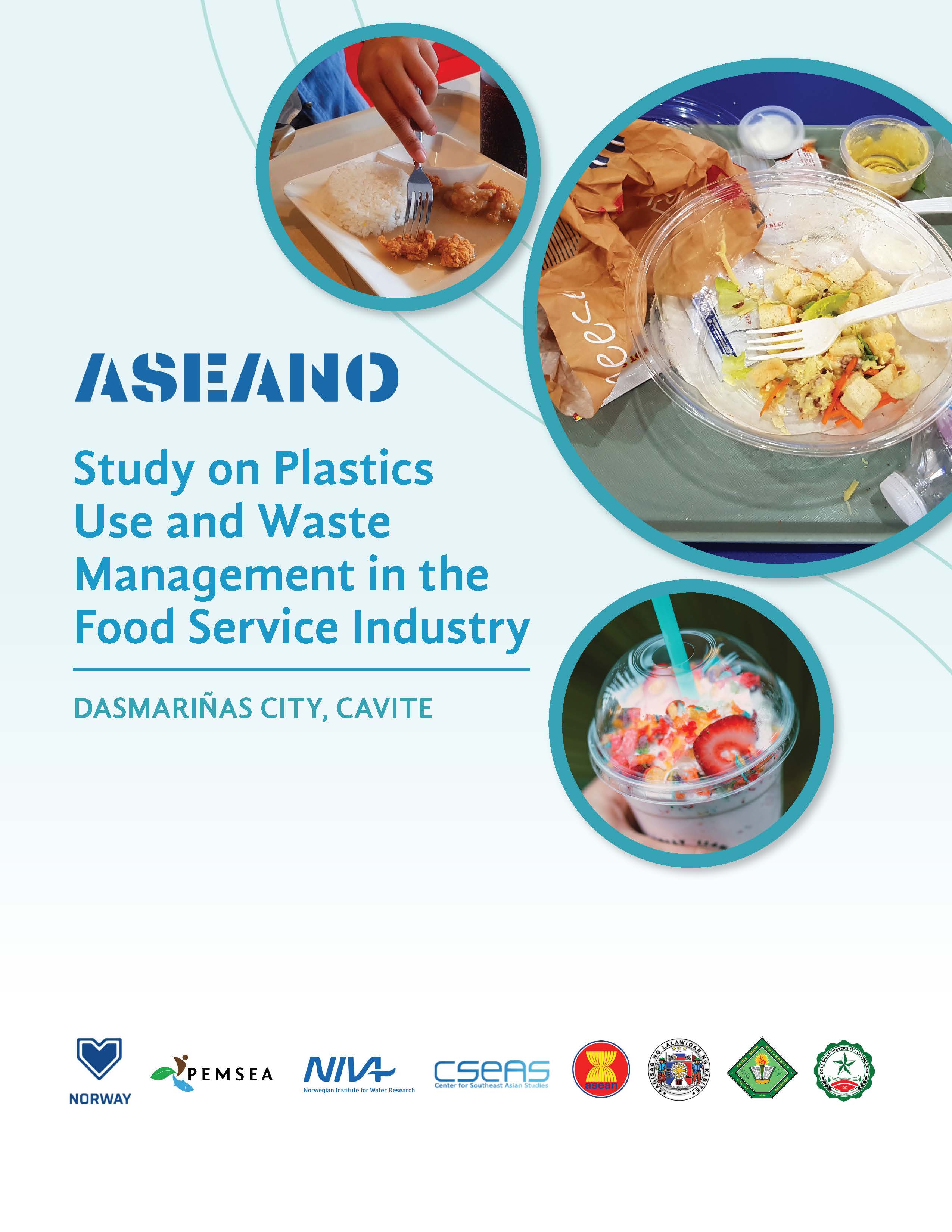
DESCRIPTION: The Food Service Industry (FSI) is comprised of businesses which prepare and serve food either onsite or offsite. This study presents the status of FSI plastic use and waste management in Cavite's Dasmarinas City while recommending interventions to address the plastics pollution problem at source. Dasmarinas City is one of the cities bordering the Imus River, which flows out to Manila Bay.
ASEANO PROJECT REPORT: Study on Plastics Use and Waste Management in the Food Service Industry
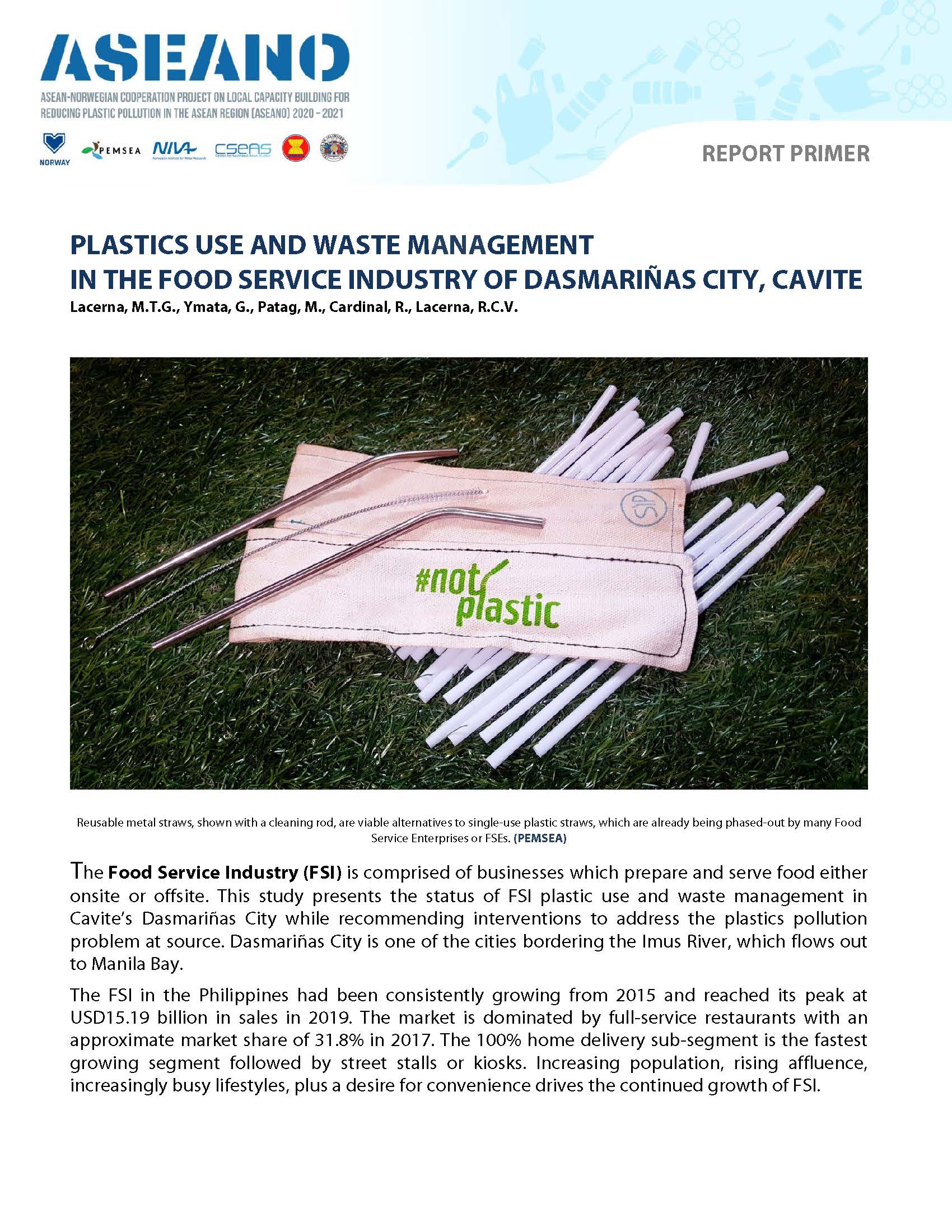
DESCRIPTION: This Baseline Study covers food service establishments (FSEs) in Dasmariñas categorized as (i) full-service restaurants, with full menu and waiting service, (ii) limited-service restaurants or quick service restaurants (QSR), with full menu but pay-as-you-order (iii) cafes/bars/pop-ups (selected menu with few chairs and tables), (iv) kiosks and stalls (purely retail, to be consumed elsewhere), and (v) catering or 100% home delivery. It excludes those unreported, unregulated and unregistered FSEs. It also covers the 6 types of food-grade plastics: (1) Polyethylene Terephthalate, (2) High Density Polyethylene, (3) Polyvinyl Chloride, (4) Low Density Polyethylene, (5) Polypropylene, and (6) Polystyrene. Methodologies used included surveys conducted of local government units (LGU) and FSEs, field observations, focus group discussions and stakeholder meetings, desk research and interviews. An inception meeting with PEMSEA and the provincial and local government of Cavite was conducted on November 8, 2021. It was followed by a stakeholders’ meeting with public and private stakeholders including the academe was held on November 25, 2021 upon project commencement to agree on the objectives, expected outputs and timelines as well as gather valuable inputs that shaped the contents of this Baseline Study. Follow-on Interviews were also conducted as needed. Considering the pandemic situation, research relied heavily on online data and information as well as reports from institutions. The surveys on FSEs and the Local Government Units (“LGUs”) were conducted from January 21 to February 10, 2022. The surveys determined ‘on the ground’ the sentiments, perceptions and practices of the FSEs. LGUs were also surveyed to determine challenges they faced in addressing the plastic waste issue and implementing their respective plastic waste ordinances.
ASEANO PROJECT PRIMER: Social Implications of Plastic Pollution Mitigation Initiatives Along the Imus River
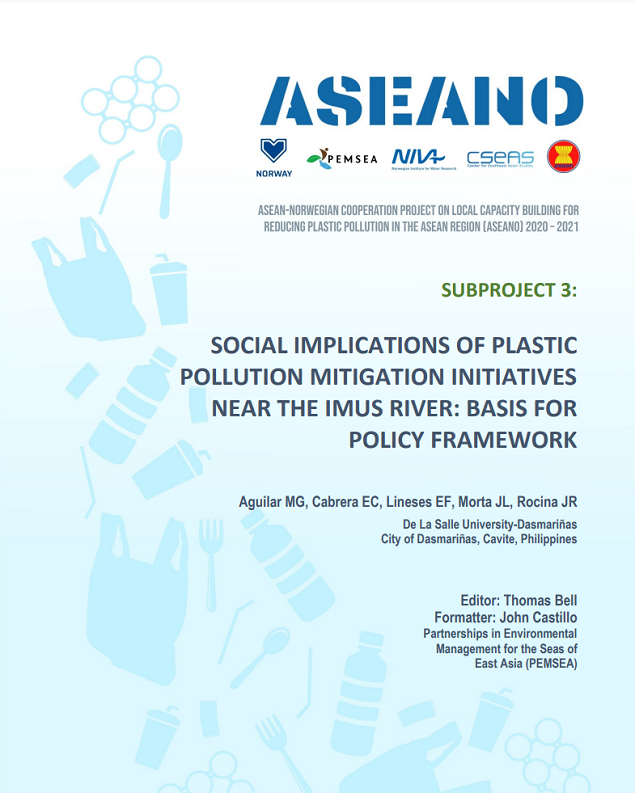
DESCRIPTION: The study investigates the socioeconomic implications of plastic waste pollution mitigation initiatives along the Imus River, which traverses the Philippine province of Cavite. It explores initiatives identified by local communities on plastic waste management and examines how these initiatives are managed and implemented. It also describes the various communities’ culturally nuanced understanding of plastic waste management as well and its implications to them as Cavite residents. It is based on reports commissioned by the ASEANO project to help Local Government Units (LGUs) better understand the plastics pollution problem and develop practical and enforceable solutions.
ASEANO PROJECT REPORT: Social Implications of Plastic Pollution Mitigation Initiatives Along the Imus River
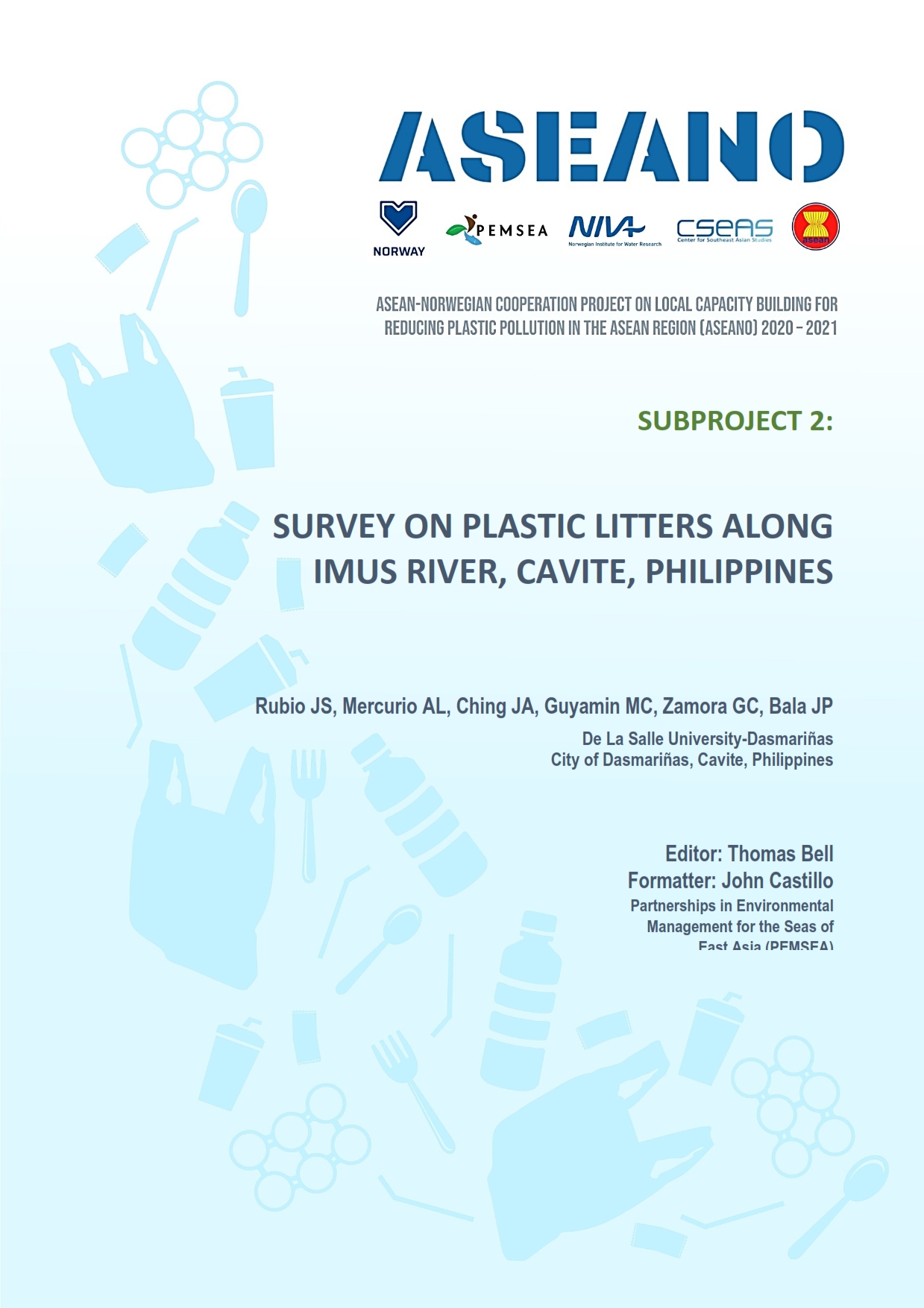
DESCRIPTION: This study investigates the socioeconomic implications of plastic waste pollution mitigation initiatives near the Imus River, which traverses through the province of Cavite. It explores initiatives identified by the communities on plastic waste management and consequently examines how these initiatives are managed and implemented. It also describes the communities’ culturally nuanced understanding of plastic waste management, as well as the implications of such management to Cavite residents. The data is gathered from five sites traversed by the Imus River, in selected barangays in (upstream to downstream) Silang, Dasmariñas, Imus, Bacoor, and Kawit. The methods used were concurrent triangulation of quantitative and qualitative data, a survey of 300 residents, and in-depth interviews of 20 key informants from different sectors in the community. Other sources of data, i.e., local documents, online and on-site focus group discussions (FGDs), and direct observations complemented the survey results.
ASEANO PROJECT PRIMER: Survey on Plastic Litter Along Imus River
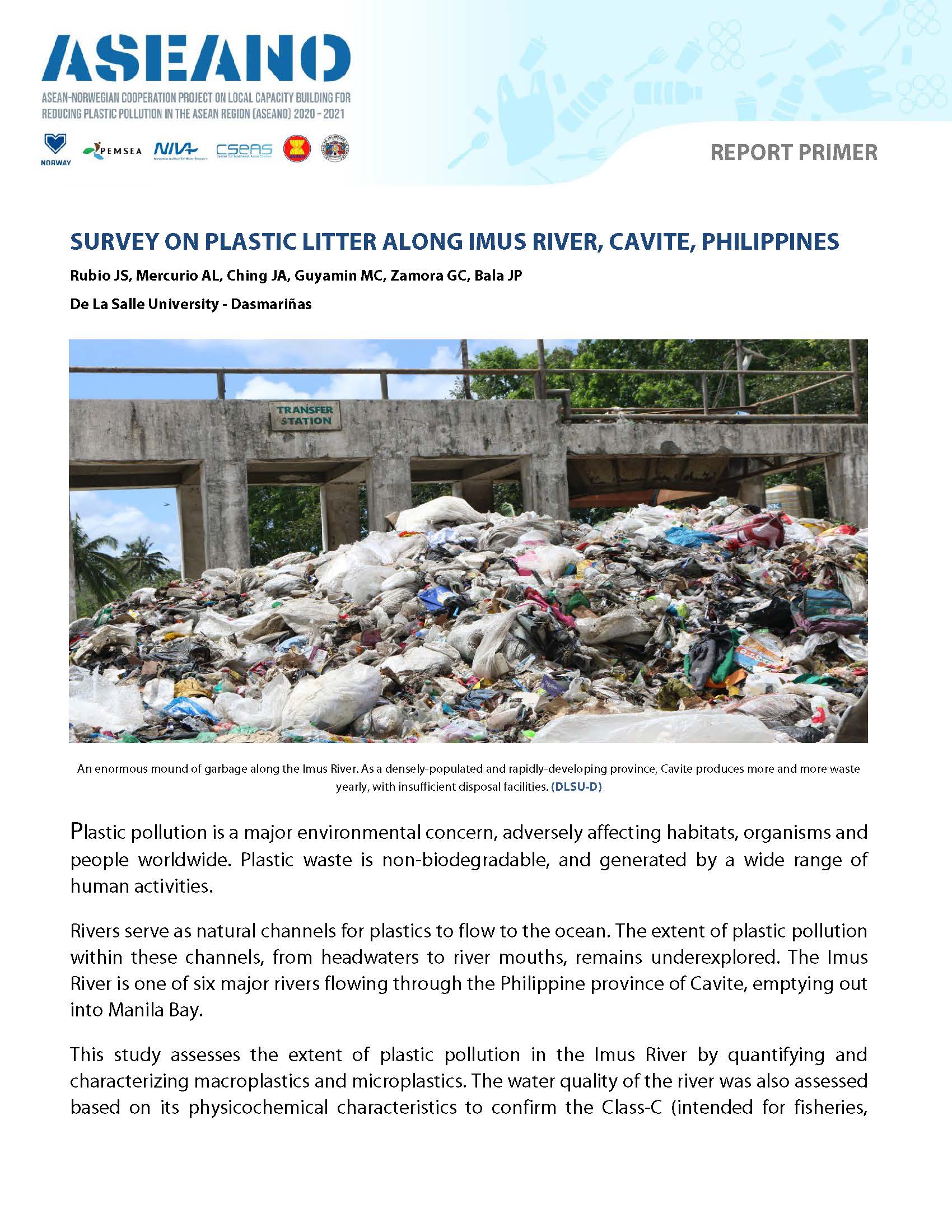
DESCRIPTION: This study assesses the extent of plastic pollution in the Imus River by quantifying and characterizing macroplastics and microplastics. The water quality of the river was also assessed based on its physicochemical characteristics to confirm the Class-C (intended for fisheries, agriculture, and recreational use) classification of the river per DENR standards. Physicochemical parameters were correlated to the quantities of collected plastic litter.
ASEANO PROJECT REPORT: Survey on Plastic Litter Along Imus River
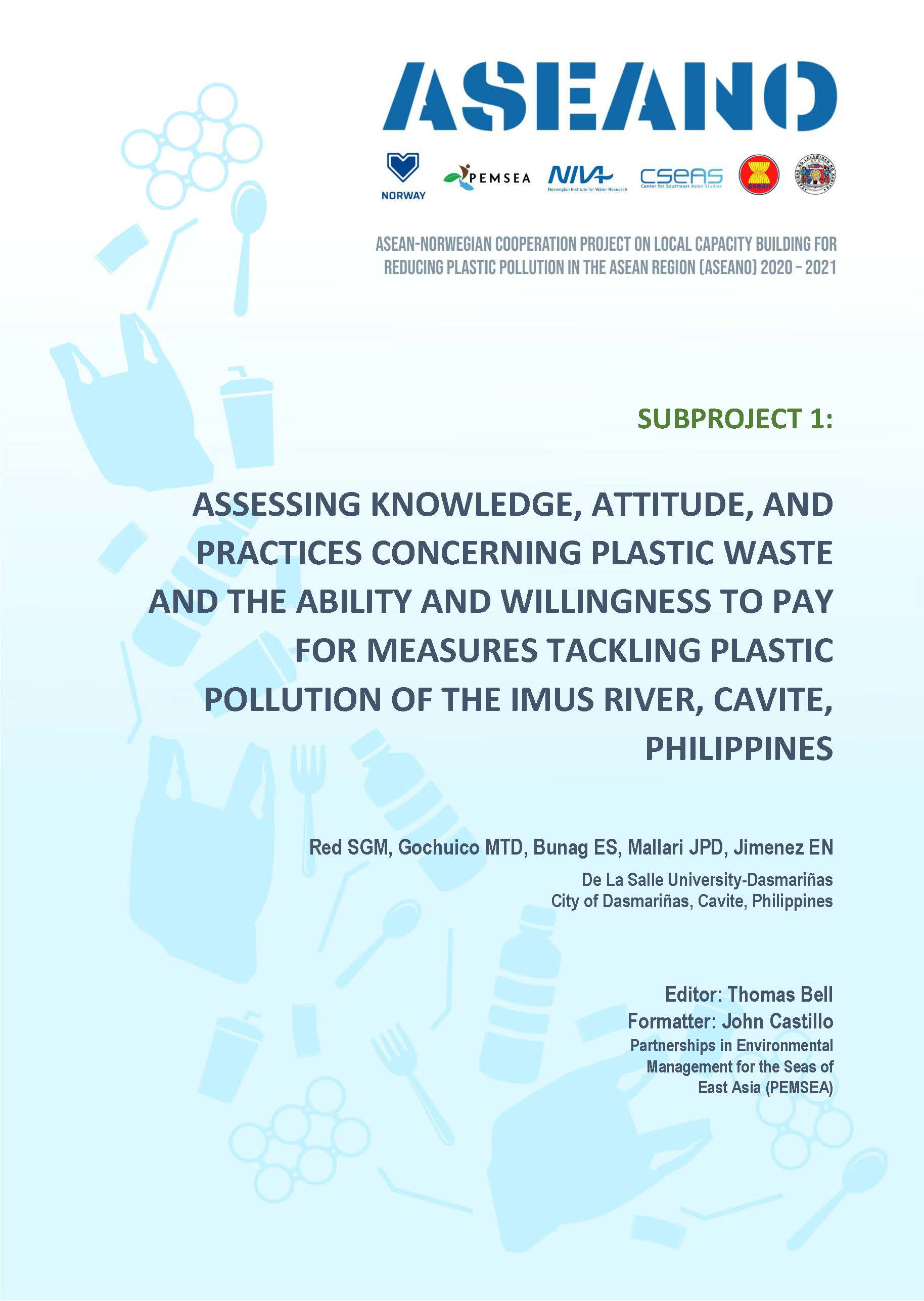
DESCRIPTION:With technical guidance/assistance from PRF, NIVA, and other partners, DLSU-D conducted a survey on plastic litters in the waters of the Imus River located in at least one barangay of five cities/municipalities (Municipality of Silang, City of Dasmariñas, City of Imus, City of Bacoor, and Municipality of Kawit). The data in this report were based on on-site observations and the collection of plastic litters during dry and wet months using. Both visual and active trawl sampling methods were used. Sampling sites were selected to represent the upstream, midstream and downstream of the entire stretch of the river located along five (5) municipalities/cities.

